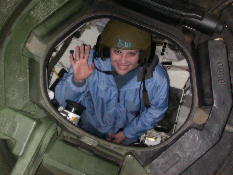April 27, 2008
One of the main characters of the show got out of the Army to join the FBI. In this episode, the FBI was searching for a Marine whose family had been kidnapped because he wouldn't give his fellow Marines the whereabouts of $1 million stolen in Iraq. (Yep, it's the Three Kings storyline again.) Here's the conversation they had:
Marine: They're gonna kill my family. If you're not part of the solution, you're part of the problem. Force recon taught me that.
FBI: Playing the "bad war badass" is not going to get your family back.
Marine: What do you know about bad wars? Chasing bin Laden in '01 don't compare to what's going on now.
FBI: Yeah, I've heard the stories.
Marine: (mocking) You've heard the stories. Talk to me when you've seen woman and children blown up by a 50-cal, or a school after a mortar attack, or a man tortured by your own guys until he begs you to kill him. You fought the bad war when it was good.
This seemed like Hollywood bullcrap to me, so I had a long talk with my husband about it. In his experience, he has never heard conversations like this about Afghanistan being a "good war" but Iraq being a "bad war." And 50-cal bullets work in Afghanistan too; I am sure some soldier in Afghanistan has made a kill that bothers him. This just smelled like projection to me: someone in Hollywood thinks Afghanistan is more justified than Iraq and writes that dialogue into the script.
Heck, everyone in Hollywood is projecting. I can't even list how many episodes of shows like Cold Case, Law & Order, CSI, Without a Trace, etc, have plotlines that seem like stereotypes gone horribly wrong. Everyone has PTSD, and the number of people who return from Iraq and murder their recruiter, journalists, or other soldiers from their platoon who are about to blow the whistle on cover-ups of massive Iraqi murders, well, it's just staggering. If this had happened even once, I think we'd have heard of it in the past seven years. It's all Hollywood exaggeration, and sadly they're exaggerating our soldiers and Marines into killers, thieves, and mental cases.
Later on in the show, thankfully this exchange happens between the two FBI agents:
Colby: What Porter said about me fighting the good war, there's truth to that. When I got pulled out of the field by military intelligence, I left a lot of guys behind.
David: And a lot of them went to Iraq...
Colby: I read the names in the papers, guys I knew, I heard about friends who came home messed up physically and messed up in the head
David: Where I grew up, people were messed up by a lot of things, a lot of it out of their control. It didn't make them any less culpable for their actions.
They're talking about the context of crime, but this point can be extended much further. War is ugly. But so is rape, abuse, incest, drugs, and a host of other things that people are exposed to on a daily basis. Soldiers watch their friends get killed, but sometimes in this messed-up world we live in, children watch their parents get killed. Wives watch their husbands murdered in front of them. Life is not only brutal on the battlefield.
Last night I finished reading The Airman and the Carpenter. The NJ state executioner thought Hauptmann was innocent, but he had to pull the switch anyway. I had never thought about executioners before, but I'm sure on occasion they have to take a life they're not comfortable with taking. But they do it. Does it haunt them? I don't know; we never hear about executioner PTSD. Nor do we hear about doctor PTSD, though I'm certain the ER is a horrifying place to work. I bet they see more people dying in a week than my husband did in an entire year. But they're not portrayed on TV as mental cases who are going to kill their fellow doctors for money.
I've been holding in a complaint for a long time because it is a delicate subject, but I'm going to air it now. There are people out there with PTSD, and they need help. I am glad that there is awareness and that they can get the help they deserve. I know it's real. But there's a nagging part of me that rues the fact that the more emphasis we put on PTSD -- the more we talk about detection and diagnosis and how widespread it is -- the more civilians expect that everyone who's been deployed is messed up in the head. And the more of these storylines we're going to get on movies and TV, which just reinforces civilians' belief that everyone has PTSD.
My husband reminded me of the time we went to The Mariners' Museum and his cousin asked cautiously if he would be OK sitting in on the video presentation of the battle of the USS Monitor because it had simulated cannon fire. It was nice of her to be concerned, but my husband just had to chuckle. He had been jittery for the first few weeks of being home, but by then he had been home for two and a half years. But she knew about PTSD and thought it affected everyone who's been deployed. She was worried about my husband and wouldn't accept his reassurance. She kept asking me if he was OK, no I mean really, is he OK, you can tell me.
Yes, he's OK. Most people are. Some do have PTSD, but most of them won't go on to murder or pillage. They need to see a doctor; what they don't need is Hollywood making them out to be ticking time bombs on every TV show and movie ever made about Iraq.
Why can't we have any storylines where someone comes home from Iraq and then sacrifices to save a life? That's happened, you know. Or where someone survives a murder attempt and helps bring the killer to justice, as Airman King did?
There's heroism among returning servicemembers. But for some reason that never makes it into TV plots.
Posted by: Sarah at
05:24 AM
| Comments (6)
| Add Comment
Post contains 1085 words, total size 6 kb.
Posted by: david foster at April 27, 2008 07:25 AM (ke+yX)
Posted by: lea at April 28, 2008 05:53 AM (NJQf+)
Posted by: Tonya at April 28, 2008 11:53 AM (KV0YP)
Posted by: david foster at April 28, 2008 12:38 PM (ke+yX)
Posted by: Crys at April 30, 2008 10:09 AM (dqGUK)
Posted by: Kahne at May 06, 2008 06:01 AM (8/Y1L)
48 queries taking 0.1202 seconds, 170 records returned.
Powered by Minx 1.1.6c-pink.














